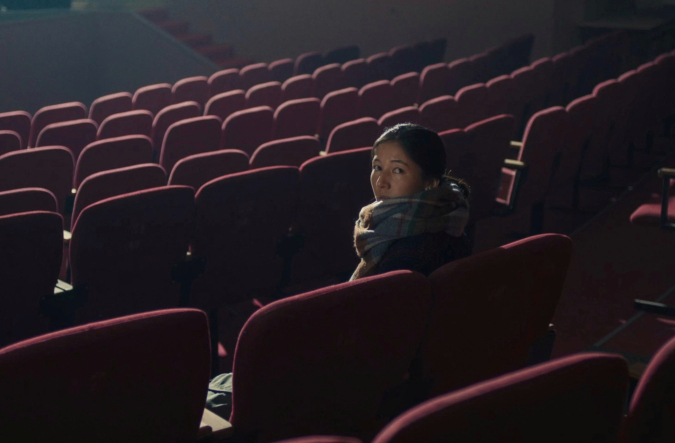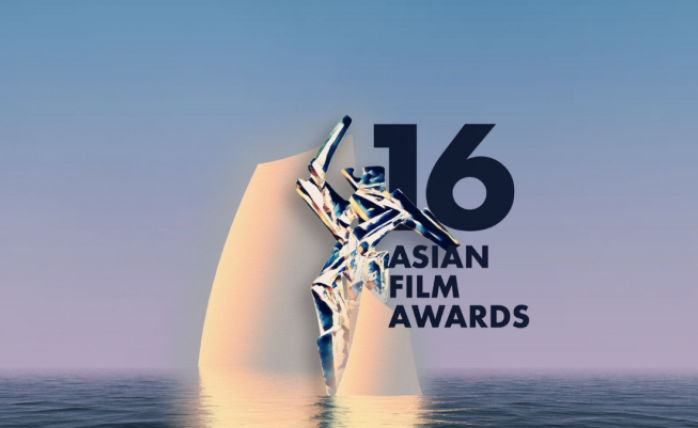Didar is a poet chained to his day job in a small newspaper. But in the age of mass consumption very few still care about poetry. While reading about a famous Kazakh poet from the 19th century who was executed by the authorities, he feels deeply shaken, realizing how difficult and fragile the life of a poet always has been. When Didar is invited to give a reading in a small town, he finds himself torn between pain and joy, his accomplishments and failures.
Cast
Yerdos Kanayev - Didar
Gulmira Khasanova - Zere
Klara Kabylgazina - Poet's mother
Crew
Written and Directed by Darezhan Omirbayev
DOP Boris Troshev
Editor Gulyaim Kozhamberdiyeva
Sound Alexander Vlaznev
Production Designer Alexander Rorokin
Costumes Aliya Imasheva
Make-Up Aida Shaizada
Assistant Director Darkhan Kozhakhan
Producers Yuliya Kim, Yerzhan Akhmet
Executive Producer Olzhas Tartayev
Produced by Kazakhfilm
Distributor Paulo Branco
Distributed by Alfama Films
Darezhan Omirbayev
Darezhan Omirbayev is a director and scriptwriter born in 1958 in the village of Uyuk,
Kazakhstan. After graduating in mathematics in 1981, he became an assistant director.
His graduation film had success and allowed him to work in Kazakhfilm as a script editor.
After a period at the VGIK (Institute of Advanced Film Studies) in Moscow, he returned to
Almaty in 1988. For several years he was a film critic for the magazine New Film.
In 1991, he directed his first feature film, KAIRAT, which was awarded the Silver Leopard
and the Fipresci Prize at the Locarno Film Festival, marking the beginning of the "Kazakh New
Wave".
Strongly inspired by Robert Bresson for whom he never hid his great admiration, Darezhan Omirbayev is considered a leading figure of the Central Asian cinematography.
In 1995, KARDIOGRAMMA evokes his childhood memories. The film was selected for the official competition at the Venice Film Festival where it won the UNESCO prize.
His third feature, KILLER (1998), a lucid, and distressing fable about the state of Kazakh society was awarded the Un Certain Regard -
Gan Foundation Prize at the Cannes Film Festival in 1998.
Darezhan Omirbayev signed his fourth feature film in 2001 with THE ROAD. It also premiered within the Un Certain Regard program of
the Cannes Film Festival.
In 2007 CHOUGA, inspired by Tolstoy’s Anna Karenina, was his fifth film. The film was awarded the Special Jury Prize at the Festival Trois Continents in Nantes.
In 2012 he directed his sixth feature film, THE STUDENT. With this riff on Dostoyevsky’s “Crime and Punishment”, Omirbayev was featured for the third time at Un Certain Regard.
In 2021, he is back with POET, a film that wins the Director's Award at the 2021 Tokyo International Film Festival and is selected in 2022 at the Berlinale in the Forum section. The Viennale also honors him in its 2022 edition.
-
TIFF - Tokyo International Film Festival 2021
Official competition - Best Director Award
-
Berlinale - Berlin International Film Festival 2022
Forum Section
-
Asian Film Awards 2023
Nominee - Best Film & Best Director
-
Lisbon & Sintra Film Festival 2022
Official competition - Best Film Award
-
Viennale - Vienna International Film Festival 2022
Official selection
-
HKIFF - Hong Kong International Film Festival 2022
World Cinema - Global Vision

Darezhan Omirbayev
DIRECTOR'S STATEMENT
Four years ago, I was invited to show some of my photographies in Lugano, Switzerland.
There, a strange feeling of solitude deeply infused in me, despite the presence of some curious people. I guess this violent confrontation between a fragile and idealistic world and reality can be experienced by many artists. From this stem I felt a story could grow, about the modern-day artist confronted with an eternal problem.
I must confess I always had been fascinated by the life and art of Makhambet Utemisov, a Kazakh poet of the 19th century, who rebelled against the authorities. Violently repressed, he was forced to hide with his family in the steppe. Quickly found, he was publicly decapitated and his head brought to Khan Zhangir, governor of Western Kazakhstan.
I decided to bring together this personal experience and some episodes of Makhambet's life. They belong to different times but have in common the loneliness, the inability to live a mundane life and the difficulty to see a future for one’s art.
Through Makhambet I also wanted to represent the most important thing, the one that gives us some strength to live, the creative impulse. Our film is about all those fragile things.
The actors of the poet, his wife and child are the same playing the parts of Makhambet and his family. Makhambet's murderer is also mirrored in the character of a predatory businessman, to accentuate the deep connections between the lives, destinies and inner worlds of my two main characters.
Obviously, today poetry and literature face a threat from new technologies. People read less and spend more and more time in front of different screens. But real poetry, the one we believe in, always finds its way, as an integral part of human nature.
News about Poet
Poet in competition at the Asian Film Awards
Darezhan Omirbayev's latest film is nominated for Best Film and the director is also nominated for Best Director.
Poet honoured by Cahiers du Cinéma
Find an interview with Darezhan Omirbayev and a review of Poet in the latest issue of Cahiers du Cinéma.
Profession: poet
In a week's time, discover in french theaters Poet, the new film by Darezhan Omirbayev. Let's take a look at the Kazakh director's thoughts on the place of poetry today.
Press review
"A melancholic variation on the slow extinction of the muses in a desperately prosaic world."
Cahiers du Cinéma (Mathieu Macheret)
"Darezhan Omirbayev belongs to this subtly deadpan movement, which looks at the world in a dubious way, while emphasising the beauty of a gesture and the irreducible strangeness of reality. A rare, hushed and bewitching cinema."
"The film tells of their double solitude, their awareness of being of little weight in the face of the erasure of their culture, laminated by the language of empires and by the furious madness of consumerism. Not to be missed."
"Soberly titled Poet, Darejan Omirbaev's new film has, like its predecessors, the clarity of a mathematical demonstration."
Positif
"A zany hymn to creation".
Télérama
"Poetry alone remains forever a tool of subversion."
Transfuge
"This illuminating and enlightening film is a salutary joy on the quest for meaning".
Les Fiches du Cinéma
"Omirbayev describes a world that is falling apart, but where poets, after many setbacks, are finally rewarded, praised and glorified.
"An ode to the freedom of words that invent imaginary worlds."
Lire Magazine Littéraire
POET










